Tooth extraction is a stressful situationeven if the operation is performed under the influence of painkillers.
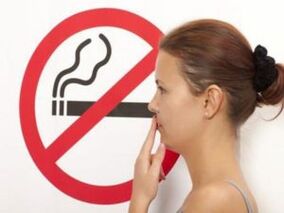
And heavy smokers, after experiencing emotions, will no doubt give up a cigarette and try to relax a bit.
They usually think of this way to reduce the pain that starts to increase when the anesthesia is over.
And it's not worth it.In the article below, is it possible to smoke after a tooth extraction and why is it strictly forbidden to do so immediately after the procedure? We will give recommendations for different situations.
Effects of cigarette smoke and nicotine on recovery after tooth extraction
Take note!Cigarette smoke contains a large number of chemical elements and compounds that are usually harmful to the body and at the same time interfere with the healing process of the wound.
Nicotine is a strong irritant to the edges of the nest left after surgery.
Narrows the blood vessels leading to the wound.
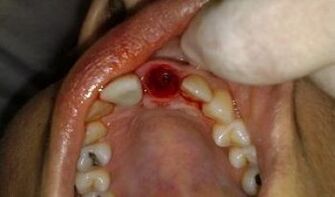
The longer and more severe the tobacco effect, the longer it will heal.
Smoking also has a negative effect on the blood clotting process.
As a result, the wound remains open for a long time, constantly bleeding, as a result of which the risk of various infections increases several times.
Inflammation is the result of infection of the wound cavity.
Symptoms and signs: general weakness, headache, fever, redness of the gums, severe pain inside.
How much smoking is forbidden?
Attention!Dentists recommend following a minimum smoking cessation period of 2-3 hours after tooth extraction.
You can smoke after this time, but only if the bleeding stops completely.
When can I smoke after brushing my teeth wisely?
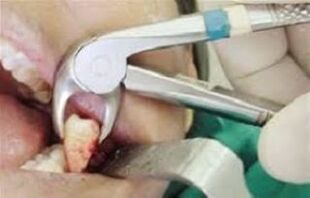
Removing a wisdom tooth (figure eight) is a long and arduous process.
This tooth is characterized by a curved, broad, enlarged root, which must sometimes be removed in parts.
After such an operation, a large sore remains on the gums,dentists often sew and loosen.
In addition, doctors often prescribe antibiotics to prevent inflammation.
Stay informed!When leaving the doctor's office, the smoker should consult his dentist about when to start smoking and eating his first cigarette.
The doctor's answer depends directly on the patient's health, the course of the operation, etc. As a rule, all recommendations are completely individual.
How much smoke should I smoke after sewing?
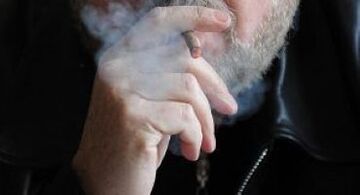
If the doctor puts a suture after the extraction, he may recommend doing the first blow 2 to 10 days before.
This period is necessary for complete healing of the wound and resorption of postoperative sutures.
Postoperative complications can develop if you do not comply with the recommended smoking cessation.
Even a single cigarette can delay wound healing.
How long can I smoke?The ideal choice is not to return to addiction for 2 to 10 days.
Hookahs and e-cigarettes
Hookah, like e-cigarettes (vaping), is contraindicated in patients for at least 3 hours after surgery. Heated smoke or steam irritates the soft tissue and can cause recurrent bleeding.
What results can you expect?
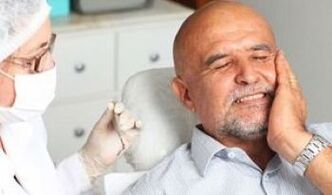
Every patient has the right to decide independently whether to smoke or not. However, before the first puff, it is advisable for every smoker to be familiar with the possible consequences if the dentist's recommendations are not followed.
Most of these can cause serious health problems, and some can be fatal.
There are 3 complications that are especially dangerous for smokers:
- Osteomyelitis.
Purulent inflammation of the bone tissue as a result of infection. The disease is very serious and can lead to death if not treated properly. - Alveolar osteitis(dry socket).
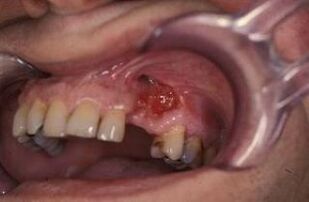 A condition in which there is no blood clot in the fossa is a natural barrier for infections to enter the pit. Blood clots can "come out" under the influence of nicotine, which is characterized by the ability to increase blood pressure inside the arteries.
A condition in which there is no blood clot in the fossa is a natural barrier for infections to enter the pit. Blood clots can "come out" under the influence of nicotine, which is characterized by the ability to increase blood pressure inside the arteries. - Alveolitis.
Inflammation of the tooth socket and nearby tissues after removal. The area of the pit is very painful, swollen and covered with a gray coating, the patient's temperature rises, submandibular lymph nodes increase, it is impossible to take food due to acute pain.
What else is not recommended?
After the operationYou should know!Here are some tips to follow after brushing your teeth:
- brush your teeth, rinse your mouth 24 hours. Such events can cause blood clots to "wash out".
- Take a hot bath, visit the bath, sauna.High temperatures can cause high blood pressure and bleeding again.
- Download yourself physically.Exercise can also trigger hypertension.
- AlcoholI'm another factor that can lead to an attack of hypertension and the resulting bleeding. Eat
- immediately after removal: It's best to wait 2-3 hours.
- It is forbidden to keep food hot or cold, which can damage the oral cavity. It is also good to avoid spicy foods. Do not open your mouth wide after sewing: muscle tension can cause them to mismatch.
- It's best not to drive,because the painkillers used during extraction make you sleepy.

Important! After tooth extraction, the patient can apply ice to the cheek to reduce pain, and take painkillers recommended by a doctor (except aspirin).
If the bleeding stops completely, it will be possible to remove the antiseptic-soaked swab in less than 20 minutes.
If the tampon stays in place longer, it can be an ideal breeding ground for bacteria.
Also read articles that will help you learn more about the issue,will make prevention faster and better:
- how to get rid of the smell of cigarettes in the mouth;
- toothpaste for smokers;
- language and smoking;
- cigarette plaque on teeth.
Reviews
Below are some reviews. If you have something to say - leave your comments in the comments at the bottom of the article, it will be useful for our readers.
I was tortured by a mad tooth: I was constantly sick, I started to fall. The dentist recommended removal as the only option.
I immediately agreed: I'm tired of taking constant painkillers. The operation went well, but the stitches still had to be sewn.
But what surprised me when the doctor told me to quit smoking! I also smoke a lot, smoking helps to combat irritability, anger and even pain.
Why did I have to resist dragging right after I left the hospital! But the will won. The result is a successful improvement process.
My tooth was removed. The doctor who gave me the postoperative advice drew my attention to the fact that it is better to smoke for 2-3 hours.
I couldn't resist for half an hour - I lit a cigarette: the blood immediately began to leak from the creator and did not stop.
I had to see a doctor again for help. It would be good for me to go back to the hospital, because everything could have ended more sadly.
The dentist said that there is a high risk of wound infection because it does not allow nicotine to be eaten and squeezed on the edges.
Baths of herbal infusions are able to alleviate the patient's condition and speed up the healing process.
Pour a bag of chamomile with boiling water, infuse for half an hour and cool to room temperature. The infusion should be taken orally and kept for about two minutes before rinsing.
No matter how strong your addiction is, you need to use common sense.
The right and only step is to follow all the doctor's recommendations.
Otherwise, the negligent patient will have to pay a very high price for disobedience - the cost of their own health. Is nicotine puff worth it?























